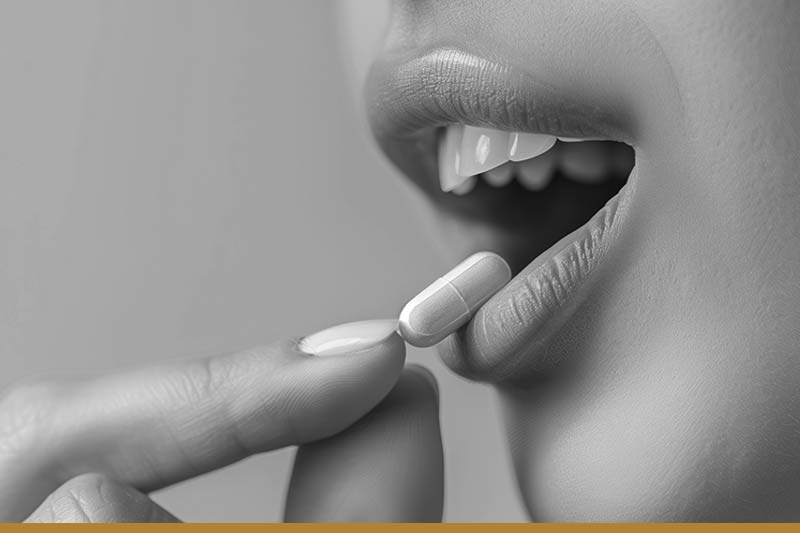Vegan Diet for Weight Loss
Reasons for becoming vegan range from wanting to be healthier to reducing animal cruelty and environmental pollution. Some people opt for a vegan diet to lose weight.
This article explains how a vegan diet for weight loss works, outlines risk factors to consider, and provides a 3-day sample plan.

What Is a Vegan Diet?
A strictly vegan diet consists of fruits, vegetables, and plant-derived foods and beverages. It excludes all animal products, including dairy, eggs, and honey. Vegans eat raw and cooked plants and replace animal protein with vegetable protein sources, such as legumes and nuts.
It is estimated that about 1-3% of the global population adheres to a vegan diet.
Can You Lose Weight on a Vegan Diet?
A vegan diet can be effective for weight loss. Many fruits and vegetables are rich in fiber and have a high water content, helping to increase satiety. Plants are also sources of antioxidants and phytochemicals that naturally support weight loss.
Plant-based foods often contain fewer calories than meat and dairy. However, grains, nuts, and seeds are more calorie-dense than other vegetables, so it is essential to limit their intake. Health experts recommend eating whole grains because they contain essential vitamins, minerals, and satiety-promoting fiber.
Studies show a vegan diet is the most effective among plant-based nutrition plans when it comes to weight loss and fat reduction. It is associated with the following weight-loss mechanisms:
- Lower caloric density
- Balanced gut microbiome
- Improved insulin sensitivity
- Increased energy expenditure
- Improved metabolism
- Decreased hunger
However, vegans can also eat unhealthy foods, such as refined and processed carbohydrates (cookies, pasta, etc.), ultimately gaining weight. Eliminating animal products from one’s diet doesn’t guarantee weight loss. It is essential to choose healthier vegan options to maintain a healthy body mass.
Health Benefits of a Vegan Weight-Loss Diet
A vegan diet contains fewer calories, saturated fats, and cholesterol than animal-based diets, providing numerous health benefits.
- Improved blood sugar levels – Fruits and vegetables are rich in fiber, which contributes to the proliferation of beneficial gut microbiota and aids in digestion, helping to regulate blood sugar.
- Improved insulin sensitivity – A healthy gut microbiome and decreased consumption of saturated fats help improve insulin sensitivity.
- Lower blood pressure – A vegan diet is low in sodium and saturated fats and high in vitamins and minerals like vitamin C and potassium, all of which are associated with lower blood pressure.
- Reduced inflammation – Plants are rich in vitamins, minerals, antioxidants, phytochemicals, omega-3 fatty acids, and other anti-inflammatory nutrients.
- Reduced body fat and weight – Plant-based foods support a healthy gut and help balance hunger and satiety hormones.
- Improved heart health – The vegan diet is associated with lower blood pressure, cholesterol, and inflammation, helping reduce the risk of cardiovascular diseases.
Vegan Diet Risk Factors
The vegan diet is consistently ranked as one of the healthiest eating plans. However, as with all diets that restrict whole food groups (e.g., meat), it can lead to nutrient deficiencies.
Vegans who don’t plan their meals properly may miss out on nutrients that are primarily found in animal products. They include:
- Protein
- Calcium
- Iron
- Zinc
- Vitamin B12
- Selenium
- Iodine
- Vitamin D
- Omega-3 fatty acids
Plant-based alternatives rich in these nutrients include legumes, nuts, seeds, quinoa, oats, leafy greens, fortified plant-based milks and cereals, tofu, and more.
Pregnant women and children, in particular, need to consume an adequate amount of these nutrients to ensure the child’s healthy growth and development.
Vegan Weight-Loss Foods
Some of the best vegan foods for weight loss include:
Leafy Greens
- Kale
- Swiss chard
- Collard greens
- Arugula
- Spinach
- Lettuce
Cruciferous and salad vegetables
- Cabbage
- Broccoli
- Cucumber
- Tomato
- Onions
- Bell peppers
- Zucchini
Fruits high in water and fiber
- Watermelon
- Apples
- Berries
- Grapefruit
- Oranges
- Pears
Whole grains
- Quinoa
- Oats
- Brown rice
- Barley
- Buckwheat
- Farro
Legumes and pulses
- Soybeans
- Lentils
- Chickpeas
- Black beans
- Kidney beans
- Green peas
Nuts and seeds
- Almonds
- Walnuts
- Chia seeds
- Flaxseeds
- Pumpkin seeds
- Sunflower seeds
Healthy fats:
- Avocado
- Nut butters
- Olive oil
- Avocado oil
- Coconut oil
- Flaxseed oil
Herbs and spices:
- Turmeric
- Cinnamon
- Ginger
- Cocoa
- Black pepper
- Oregano
- Rosemary
- Mint
- Green tea
Fermented plant products
- Sauerkraut
- Pickles
- Tempeh
- Kimchi
Foods to Avoid on a Vegan Weight-Loss Diet
The following foods are strictly forbidden in a vegan diet:
- All meat (poultry, red meat, fish, seafood)
- All animal-derived dairy (milk, yogurt, cheeses, ice cream)
- Eggs
- Honey and other bee products
- Animal-derived additives (e.g., gelatin)
One of the dangers of becoming vegan and avoiding entire food groups is relying on refined carbohydrates. Avoid the following foods to effectively lose weight:
Sugary products:
- Cookies
- Chocolate
- Granola bars
- Candy
- Cakes
- Breakfast cereals
- Sweetened plant-based milk
- Sugary drinks
Refined carbohydrates:
- White bread
- Packaged breads
- Pizza
- Pastry
- Pasta
Vegan meat substitutes:
- Veggie burgers
- Hot dogs
- Sausages
Other ultra-processed foods:
- Chips
- Ready-to-eat meals
- Margarine
- Instant soups
Many vegans also avoid eating in restaurants because of the potentially inadequate preparation process. Foods in restaurants that may contain animal-derived ingredients include:
- French fries
- Salad dressings
- Pesto
- Baked beans
- Pasta
- Desserts
Extra Tips for Losing Weight on a Vegan Diet
A vegan diet can promote weight loss, especially if one adheres to the following practices.
Prioritize Whole Foods
Unrefined, unprocessed whole foods such as fruits, vegetables, and whole grains are nutrient-dense and leave you feeling full for longer, aiding your weight management. Avoid carbohydrates that are high in sugar, fat, and calories and low in essential nutrients.
Eat More Protein and Fiber
Protein and fiber increase satiety and help you avoid sugar cravings. Make sure you consume enough legumes, pulses, nuts, seeds, and fiber-rich vegetables during the day.
Note: Learn more about foods that naturally suppress appetite and promote weight loss.
Limit Your Portions
If the total amount of calories you consume during the day exceeds the energy spent, you will gain weight, even if the food you eat is vegan and generally healthy. However, you don’t have to count calories. Aim for three standard meals per day that include a lot of non-starchy vegetables and salads, protein (legumes, pulses), and unrefined carbohydrates (quinoa, brown rice). Enjoy one or two healthy snacks between meals, such as an apple, half a cup of berries, a glass of dairy-free milk, or a handful of nuts.
Listen to Hunger and Fullness Signals
Eat only when hungry and stop eating when you are full. Learn about the benefits of intuitive eating, which promotes listening to internal hunger cues, mindfulness, and having a positive relationship with one’s body.
Include Dietary Supplements
Many vegans take dietary supplements to ensure adequate intake of nutrients that are minimally present in plant-based foods. They especially have to watch out for vitamin B12 and iron because they are only found in animal products. Monitor your nutrient levels at regular intervals and consult your healthcare provider about the best supplements to take to avoid nutrient deficiencies.
Incorporate Daily Physical Activity
Regular exercise is a crucial element in maintaining optimal health. Doctors often prescribe it for weight loss. It helps improve mood, increase energy levels, balance hormones, and improve other health markers associated with weight management. Engage in activities you enjoy, including walking, yoga, swimming, dancing, weightlifting, martial arts, and other forms of movement.
Prepare Meals in Advance
We often make poor nutritional choices due to a lack of time to prepare a balanced meal. To avoid eating fast food when in a rush, set aside an hour or two on weekends to prepare ingredients for delicious, nourishing meals during the week.
- Wash fruits and salads
- Cook grains and legumes
- Bake whole grain breads
- Prepare vegetable spreads
Vegan Weight-Loss Diet: Sample Meal Plan
A vegan diet may seem restrictive and monotonous, but it actually provides many options for varied and delicious meals. Some are included in this 3-day vegan sample plan for weight loss.
| Day 1 | |||
| Breakfast | Lunch | Snack | Dinner |
| 2 vegan pancakes, 1 tbsp peanut butter, ¼ cup blueberries. | A bowl of ½ cup quinoa, 1 cup cooked kidney beans, ½ avocado + lettuce salad. | 1 carrot and 1 tbsp hummus. | Lentil soup and ½ sliced cucumber. |
| Day 2 | |||
| Breakfast | Lunch | Snack | Dinner |
| Chia seeds with almond milk, a handful of walnuts, raspberries, and ½ banana. | Eggplant, lemon, and garlic spread on a whole wheat tortilla with grilled tofu + tomato salad. | 2 tbsp pumpkin seeds. | Roasted cauliflower and pumpkin soup with whole wheat toast and hummus. |
| Day 3 | |||
| Breakfast | Lunch | Snack | Dinner |
| Avocado toast + arugula salad. | Baked sweet potatoes, ½ cup brown rice, ½ cup black beans + cabbage salad. | An apple or 3 plums. | 1 cup chickpea curry + ½ cup quinoa. |
Conclusion
A well-planned vegan diet is among the healthiest eating ways to eat, especially when refined and processed foods are limited or eliminated. It can provide numerous health benefits, including weight reduction. Due to exclusively plant-based meals that are rich in fiber and other filling ingredients, vegans often have a lower body mass than people following other dietary plans.















